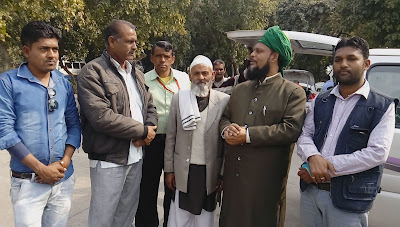The
world of Islam today is splintered on denominational and sectarian lines. The lineages of the great
divide
among the Muslims go
far back into history, originating
in the disputes over obedience
to authority and
the
sharing of power in
the times after the Holy Prophet (sa) and his rightly-guided
successors, the pious Caliphs.
It’s a searing fact of history that after that
first century of Islam, the
Muslims had never been united as a single spiritual and political
order. With the
great schism
among
the
believers leading
to the formation
of
sectarian
identity among
them;
the
lofty identity of Islam receded to the backdrop and the Muslims were
reduced to be either Sunnis
or
Shiites and in
course of time, with the entrenchment
of deep
divisions over questions of Islamic law, new groups emerged among them on sectarian lines.
Indeed, there is no monolithic/single/unified ‘Islam’ in our times; there are many ‘Islams’ as the proliferation of religious groupings among the nearly two billion Muslims around the world so clearly demonstrate. This is unfortunately true as well, even in the relatively humble and small world of Ahmadiyya Islam- the community of Muslims assembled originally by the Promised Massih Hadhrat Mirza Ghulam Ahmad (as) of Qadian in the previous century. Today, despite all that the Promised Massih (as) had taught about the unity of all religions in Islam, the Ahmadis or the people who claim themselves to be the followers of that great saint of Islam, themselves are splintered into numerous sects and groupings. For instance, the different Ahmadi sects include the following: Jamaat-e-Ahmadiyya Qadian, Anjuman Ahmadiyya Lahore, Jamaat-e-Ahmadiyya Al Muslemun, Jamaat-e-Ahmadiyya Islah Pasand, Jamaat Ul Sahih Al Islam and the Jamaat-e-Ahmadiyya Haquiqui.
 No
one can deny that the
Holy Qur’an had
indeed warned the Muslims about the lessons of human history. Whereas
unity and cohesion leads to progress and blessings, disagreement and
splintering leads to decline and fall. The Divine Book says, “This
community of yours is one single community, and I am your Lord. So
fear Me. But they are divided into sects, each sect rejoicing in its
belief.” (23:
53-54). “And
if your Lord had willed, He could have made mankind one community.
Yet they continue to disagree (among them) except those upon whom
your Lord has bestowed His Mercy. This is why He created them ...”
(11:
119-120).
No
one can deny that the
Holy Qur’an had
indeed warned the Muslims about the lessons of human history. Whereas
unity and cohesion leads to progress and blessings, disagreement and
splintering leads to decline and fall. The Divine Book says, “This
community of yours is one single community, and I am your Lord. So
fear Me. But they are divided into sects, each sect rejoicing in its
belief.” (23:
53-54). “And
if your Lord had willed, He could have made mankind one community.
Yet they continue to disagree (among them) except those upon whom
your Lord has bestowed His Mercy. This is why He created them ...”
(11:
119-120). It is possible to look at the diversity of situations and the plurality of opinions among Ahmadis as the existential condition of the times we are living in. In dealing with questions where we differ among ourselves, however, it is important to keep the big picture in mind all the time- including the obligations of brotherhood left behind by the Holy Prophet (sa) when he stated: “A Muslim is the brother of another Muslim. Do not hate each other and do not be jealous of each other and do not desert each other, O worshipers of Allah! Be brothers! And whoever meets the needs of his brother, Allah will meet his needs”. Indeed, the Ahmadi believers have a duty to respect the integrity and religious choices of our fellow humans found in different sects of Islam. Rather than seeking to project narrow interests, group-based prejudices and sectarian mindsets; engage with the brethren in faith in a spirit of solidarity and kindness in furthering the shared ideals of Islam.
An Appeal to All
In
October 2008, in the seventh year of the present Divine Manifestation, Hadhrat Muhyi-ud-Din Al Khalifatullah Munir Ahmad Azim
Saheb (atba) of Mauritius made a fervent, Divinely-inspired Appeal to all mankind,
especially to his Ahmadi brothers found in various sects of the
Jamaat-e-Ahmadiyya to improve
the quality of their spiritual engagements and public debates and to rise
above their sectarian
perspectives
so as to truly
embrace
the purpose of a spiritual life.
Read
the Document Below:




